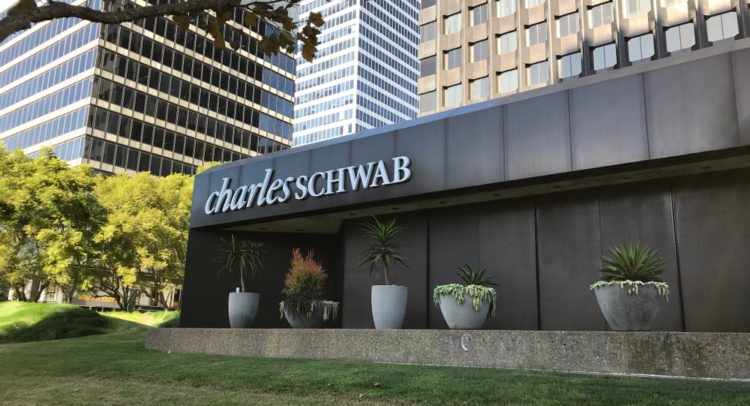The Charles Schwab Corporation (NYSE: SCHW) has settled a Securities and Exchange Commission (SEC) investigation over disclosures related to its robo-adviser program, the Schwab Intelligent Portfolios (SIP) advisory solution.
Claim 70% Off TipRanks Premium
- Unlock hedge fund-level data and powerful investing tools for smarter, sharper decisions
- Stay ahead of the market with the latest news and analysis and maximize your portfolio's potential
The brokerage firm’s three investment adviser subsidiaries agreed to settle charges by paying $186.5 million to harmed robo-adviser clients. The SEC charged Schwab for misleading clients about the program fees and failing to adequately disclose their investment returns.
Following the settlement, shares of the company declined more than 3% to close at $60.24 on Monday.
Allegations
The SEC alleged that Schwab misbehaved with clients between March 2015 and November 2018. For its own business interests, the broker was accused of keeping a large percentage of its clients’ assets in cash.
According to the SEC’s findings, Schwab’s model portfolios had roughly 6% to 29.4% of clients’ assets in cash, which is believed to have affected portfolio performance without clients’ knowledge. The SEC claimed that the company made profits out of that cash in the form of interest and created a “conflict of interest” by failing to pay the full amount to clients along with interest.
The regulatory order stated that the company made “false and misleading statements” on SEC’s regulatory filings and “falsely claimed” that the cash allocations “were determined through a ‘disciplined portfolio construction methodology’ when in fact they were pre-set for business reasons.”
Gurbir S. Grewal, the SEC enforcement director, said, “Schwab claimed that the amount of cash in its robo-adviser portfolios was decided by sophisticated economic algorithms meant to optimise its clients’ returns. In reality, it was decided by how much money the company wanted to make.”
Settlement
Though Schwab resolved the matter by agreeing to pay penalties, it neither admitted nor denied misconduct in the SEC’s claim. No fees were charged from clients for the uninvested portion of assets.
The company commented, “We are proud to have built a product that allows investors to elect not to pay an advisory fee in return for allowing us to hold a portion of the proceeds in cash, and we do not hide the fact that our firm generates revenue for the services we provide.”
As part of the settlement, an independent consultant will be appointed by Schwab to review its robo-adviser’s policies and operations.
Interestingly, Schwab’s second-quarter 2021 financial results included about a $200 million charge related to the SEC investigation.
Grewal said, “Schwab’s conduct was egregious and today’s action sends a clear message to advisers that they need to be transparent with clients about hidden fees and how such fees affect clients’ returns.”
Wall Street’s Take
Recently, Raymond James analyst Patrick O’Shaughnessy reiterated a Hold rating on the stock but did not assign a price target.
Shaughnessy believes that SEC’s retail equity order flow agenda offers limited downside for the company.
According to the analyst, order flow revenue for equities and options is expected to contribute 8% to the company’s net revenue and 16% to pre-tax income in 2022.
Looking at the consensus breakdown, based on nine Buys and four Holds, the rest of the Street is cautiously optimistic about the stock, with a Moderate Buy rating. The average Charles Schwab price target of $91.86 implies 52.49% upside potential. Shares have lost more than 15% over the past year.

Smart Score
Charles Schwab scores an 8 of 10 from TipRanks’ Smart Score rating system, indicating that the stock has strong potential to outperform market expectations.

Bottom-Line
Given the company’s diversified investment portfolio and expected benefits of rising interest rates, investors may cautiously invest in the stock considering it an attractive buying opportunity.
Read full Disclosure
















